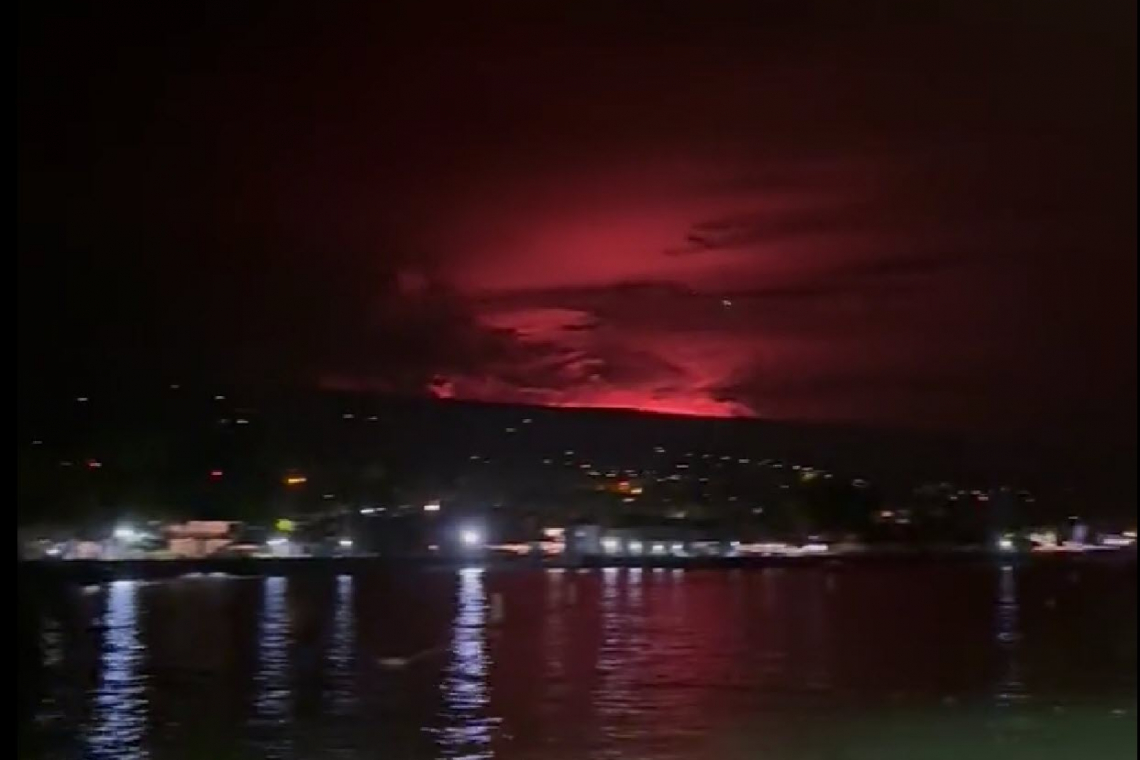At approximately 11:30 p.m. Hawaii Standard Time on November 27, an eruption began in Moku‘āweoweo, the summit caldera of Mauna Loa, inside Hawai‘i Volcanoes National Park.
At this time, lava flows are contained within the summit area and are not threatening downslope communities. Winds may carry volcanic gas and possibly fine ash and Pele’s hair downwind.
Residents at risk from Mauna Loa lava flows should review preparedness and refer to Hawai‘i County Civil Defense information for further guidance.
Based on past events, the early stages of a Mauna Loa eruption can be very dynamic and the location and advance of lava flows can change rapidly.
If the eruption remains in Moku‘āweoweo, lava flows will most likely be confined within the caldera walls. However, if the eruptive vents migrate outside its walls, lava flows may move rapidly downslope.
LIVE VIDEO:
From the United States Geological Survey (USGS):
Hazard Notification System (HANS) for Volcanoes
Volcano: Mauna Loa (VNUM #332020)
Current Volcano Alert Level: WARNING
Previous Volcano Alert Level: ADVISORY
Current Aviation Color Code: RED
Previous Aviation Color Code: YELLOW
Issued: Sunday, November 27, 2022, 11:45 PM HST
Source: Hawaiian Volcano Observatory
Notice Number: 2022/H602
Location: N 19 deg 28 min W 155 deg 36 min
Elevation: 13681 ft (4170 m)
Area: Hawaii
Volcanic Activity Summary:
At approximately 11:30 p.m. HST this evening, November 27, an eruption began in Moku‘āweoweo, the summit caldera of Mauna Loa, inside Hawai‘i Volcanoes National Park. At this time, lava flows are contained within the summit area and are not threatening downslope communities. Winds may carry volcanic gas and possibly fine ash and Pele’s hair downwind.
Residents at risk from Mauna Loa lava flows should review preparedness and refer to Hawai‘i County Civil Defense information for further guidance.
Based on past events, the early stages of a Mauna Loa eruption can be very dynamic and the location and advance of lava flows can change rapidly.
If the eruption remains in Moku‘āweoweo, lava flows will most likely be confined within the caldera walls. However, if the eruptive vents migrate outside its walls, lava flows may move rapidly downslope.
HVO is in close consultation with emergency management partners and will be monitoring the volcano closely to provide further updates on activity. As soon as possible, HVO will conduct aerial reconnaissance to better describe the eruption and assess hazards.
Recent Observations:
[Volcanic cloud height] N/A
[Other volcanic cloud information] N/A
[Lava flow/dome] N/A
[Ballistics] N/A
[Lava flow] N/A
Hazard Analysis:
[General hazards] For discussion of Mauna Loa hazards, please see: https://volcanoes.usgs.gov/observatories/hvo/hawaii_hazards.html and https://pubs.usgs.gov/fs/2012/3104/
[Ash cloud] N/A
[Ashfall] N/A
[Lava flow/dome] N/A
[Mud flow] N/A
[Other hazards] N/A
[Volcanic gas] N/A
[Lava flow] N/A
Remarks:
Remarks: Residents with questions about emergency response and resources that may be available to assist those at risk should consult https://www.hawaiicounty.gov/departments/civil-defense/active-civil-defense-alerts-and-maps.
Hawai‘i Volcanoes National Park has closed the Mauna Loa summit area to visitors; for more information please see https://www.nps.gov/havo/index.htm.
Vog information can be found at https://vog.ivhhn.org/.
Contacts:
Next Notice:
HVO Daily Updates on the status of Mauna Loa activity will be posted on the HVO web site at: https://www.usgs.gov/volcanoes/mauna-loa/volcano-updates
You can receive these updates via email by subscribing to the free Volcano Notification Service at: http://volcanoes.usgs.gov/vns/. Questions can be emailed to
From the Hawaiian Volcano Observatory:


